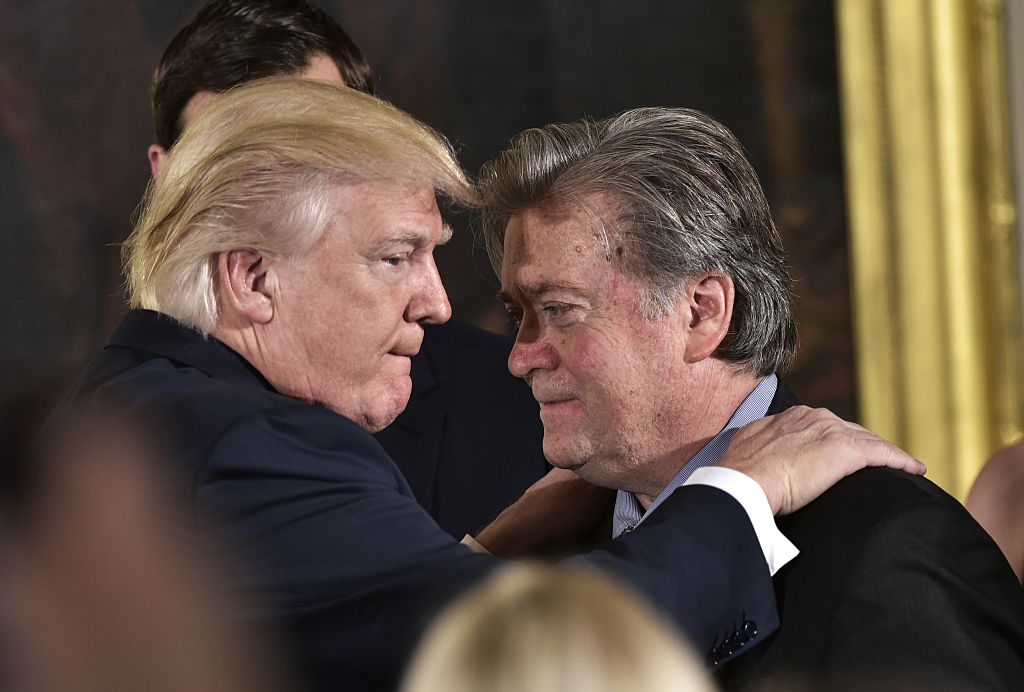White House justifies Steve Bannon's seat on the National Security Council by noting he was in the Navy


A free daily email with the biggest news stories of the day – and the best features from TheWeek.com
You are now subscribed
Your newsletter sign-up was successful
President Trump raised eyebrows and hackles on Saturday night when he reorganized the National Security Council (NSC), naming chief strategist Stephen Bannon as a member of the top-tier "principals committee" and apparently demoting the director of national intelligence and chairman of the Joint Chiefs of Staff — the nation's top intelligence and military officials, respectively — to members who "shall attend where issues pertaining to their responsibilities and expertise are to be discussed."
The NSC is "effectively the central nervous system of the U.S. foreign policy and national security apparatus," David Rothkopf, CEO of Foreign Policy's publisher and an expert on the NSC, writes in The Washington Post. The principals committee is the body that presents security options directly to the president and also, according to a 2011 Reuters article, finalizes the kill-or-capture list of militants. Rothkopf calls the elevation of Bannon and effective demotion of Gen. Joseph Dunford and whoever replaces DNI James Clapper "deeply worrisome," especially given Bannon's lack of national security experience and Trump's reputed dislike of taking advice "when it contradicts his own views."
White House Press Secretary Sean Spicer pushed back on the criticism on ABC's This Week, arguing that Trump was "streamlining" decision-making, adding that Bannon is "a former Naval officer" with "a tremendous understanding of the world and the geopolitical landscape that we have now." Bannon served seven years in the Navy in the 1970s and '80s before turning to banking, movie production, and running a far-right website. As for sidelining Dunford, Spicer said, "The president gets plenty of information from the chairman of the Joint Chiefs of Staff."
The Week
Escape your echo chamber. Get the facts behind the news, plus analysis from multiple perspectives.

Sign up for The Week's Free Newsletters
From our morning news briefing to a weekly Good News Newsletter, get the best of The Week delivered directly to your inbox.
From our morning news briefing to a weekly Good News Newsletter, get the best of The Week delivered directly to your inbox.
A senior NSC official told The Washington Post on Sunday that the DNI and Dunford "are invited as attendees to every single NSC meeting," adding, "There's nowhere in that document that says they are excluded." You can watch the White House chief of staff make a similar argument to an incredulous Chuck Todd in the CNN roundup below.
Former President Barack Obama's strategist David Axelrod controversially sat in on some NSC meetings, but there has traditionally been what NPR security editor Philip Ewing calls "a Great Wall of China-separation" between the presidents' political team and nonpartisan specialists. George W. Bush banned his chief strategist, Karl Rove, from NSC meetings because, former Bush chief of staff Josh Bolton explained last fall, he wanted to send a strong signal that the decisions he was "making that involve life and death for the people in uniform will not be tainted by any political decisions."
A free daily email with the biggest news stories of the day – and the best features from TheWeek.com
Peter has worked as a news and culture writer and editor at The Week since the site's launch in 2008. He covers politics, world affairs, religion and cultural currents. His journalism career began as a copy editor at a financial newswire and has included editorial positions at The New York Times Magazine, Facts on File, and Oregon State University.
-
 ‘Restaurateurs have become millionaires’
‘Restaurateurs have become millionaires’Instant Opinion Opinion, comment and editorials of the day
-
 Earth is rapidly approaching a ‘hothouse’ trajectory of warming
Earth is rapidly approaching a ‘hothouse’ trajectory of warmingThe explainer It may become impossible to fix
-
 Health insurance: Premiums soar as ACA subsidies end
Health insurance: Premiums soar as ACA subsidies endFeature 1.4 million people have dropped coverage
-
 British warship repels 'largest Houthi attack to date' in the Red Sea
British warship repels 'largest Houthi attack to date' in the Red SeaSpeed read Western allies warn of military response to Iranian-backed Yemeni rebels if attacks on ships continue
-
 Houthi rebels claim Red Sea ship attacks
Houthi rebels claim Red Sea ship attacksspeed read Iran-backed Yemeni group vows to escalate aggression towards Israel-linked vessels in revenge for Gaza war
-
 Israel plans next phase of Gaza war as first hostages released
Israel plans next phase of Gaza war as first hostages releasedSpeed read After four-day ceasefire 'we will not stop' until destruction of Hamas, says Israel
-
 Mob storms Russian airport 'looking for Jews'
Mob storms Russian airport 'looking for Jews'Speed Read Plane from Israel surrounded by rioters chanting antisemitic slogans after landing in Russia's Dagestan region
-
 Tuberville's military promotions block is upending lives, combat readiness, 3 military branch chiefs say
Tuberville's military promotions block is upending lives, combat readiness, 3 military branch chiefs saySpeed Read
-
 Ukraine's counteroffensive is making incremental gains. Does it matter in the broader war?
Ukraine's counteroffensive is making incremental gains. Does it matter in the broader war?Speed Read
-
 US commissions first-ever Navy ship in a foreign port
US commissions first-ever Navy ship in a foreign portSpeed Read
-
 British spy chief, Wagner video suggest Prigozhin is alive and freely 'floating around'
British spy chief, Wagner video suggest Prigozhin is alive and freely 'floating around'Speed Read
